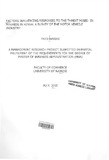| dc.description.abstract | Companies respond to the threat posed by HIV/AIDS in many different ways. Some
have a one stop comprehensive education, prevention and treatment program while
others have nothing in place and respond as if there is no relationship between
HIV/AIDS and the business world.
This study was undertaken to establish if there are any factors which influence
companies to respond the way they do to the threat posed by HIV/AIDS. Does the
response depend on nature of ownership, size, HIV incidence rate, age (how long the
companies have been operating in Kenya) or profitability? There already exist
guidelines on dealing with HIV/AIDS at work from the Federation of Kenya Employers
(FKE), the Kenya Government and the International Labour Organisation (lLO) which
have been communicated to companies but which are not being adhered to by all the
companies.
The study focused on factors influencinq the way companies in the New Vehicle
Industry in Kenya respond to the threat posed by HIV/ AIDS. Data was collected using
questionnaires which were completed by the Human Resources Managers of these
companies. The data collected was analysed using descriptive statistics. The data
analysed was presented in tables, charts and percentages.
The findings of this study revealed that the age of the company (that is how long they
have been operating in Kenya), Nature of ownership, size and profitability influence the
way the companies respond to the threat posed by HIV/AIDS. However, knowledge
about the extent of HIV infection among staff was found to be a trigger but not an
absolute factor influencing company responses to the threat posed by HIVj AIDS.
The study recommends company joint campaigns, work based voluntary counseling and
testing (VCT), Establishment of HIV/AIDS solidarity funds, voluntary HIV/AIDS peer
education, development of an HIV/AIDS Legal framework, support from government
organizations and UN bodies and Tax exemption on HIV/AIDS expenses as a way of
encouraging companies to respond appropriately to the threat posed by HIV/AIDS.
The study suggests that further research should aim at explaining why, despite the high
level of awareness of HIV/AIDS, people still increasingly get infected. | en |

